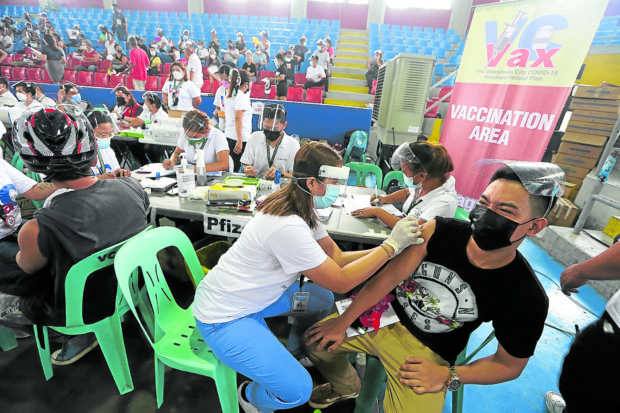
POPULATION PROTECTION Residents continue to queue for inoculation at Valenzuela Astrodome in Valenzuela City as local governments around the country work double time to hasten the rollout of COVID-19 vaccines. The Department of Health says the country has administered 10 million jabs, mostly first doses, since March. —NIÑO JESUS ORBETA
MANILA, Philippines — Adults who share the same household with a medical front-liner are now eligible for vaccination, either in the hospital where the health worker is employed or in their respective local governments.
Vaccination chief implementer Secretary Carlito Galvez Jr. on Monday said all 1.6 million health workers in the government’s top priority list already received at least one vaccine shot and “we are now pursuing their second dose.”
The Philippines has administered more than 10 million jabs, mostly first doses, since the vaccine rollout in March. This was equivalent to 14 percent of the herd immunity target of 70 million people.
Galvez and Health Secretary Francisco Duque III on Monday welcomed another 1 million Sinovac and 249,600 US-made Moderna vaccines shipped on Sunday night.
National Vaccination Operations Center (NVOC) chief and Health Undersecretary Myrna Cabotaje said 150,000 of the Moderna vaccines would be distributed in Metro Manila, while 99,600 doses were bought by International Container Terminal Services Inc. of business tycoon Enrique Razon Jr. for his employees.
The fresh batch of Sinovac would be sent to areas experiencing a spike in COVID-19 cases such as Western Visayas, Eastern Visayas, Northern Mindanao, Zamboanga Peninsula, Davao Region and Soccsksargen (South Cotabato, Cotabato, Sultan Kudarat, Sarangani and General Santos), the Department of Health said.
In a Viber message on Monday, Cabotaje said a health worker’s immediate family, including adult housemates, helpers and drivers, may now receive the vaccine as part of Priority Group A1.9, or the Expanded Priority Group A1 according to NVOC Advisory No. 54 issued on June 23.
On May 27, the Inter-Agency Task Force for the Management of Emerging Infectious Diseases (IATF) included health workers’ families in the priority group to allay hospital workers’ fears of exposing other members of their households to the virus.
“But our focus in the meantime are [families of health workers] under A1.1, A1.2 and A1.3 because of limited [vaccine] supply. Some [local governments] have started [vaccinating kin] but they [do] it based on their supply,” Cabotaje said, referring to health workers assigned to COVID referral hospitals, public and private facilities providing COVID care and quarantines.
There could be 8 million people under the new expanded group, assuming each health worker belonged to a family of five, she said.
Baseless
The IATF also dismissed calls by opposition Sen. Franklin Drilon to veer away from buying more Sinovac doses and instead focus on procuring the US-made Pfizer brand, supposedly due to the lower efficacy offered by the Chinese vaccine against the globally spreading Delta variant.
“That comment has no basis [as] there is no clinical data to show that Sinovac is less effective against [the newer] variants,” Galvez said.
He said Sinovac was being used in 28 countries and, right now, offered the “steadiest” supply to the Philippines.
Malacañang also said on Monday that the Sinovac vaccines were safe to use in the Philippines despite reports in Indonesia about more than 350 doctors and medical workers who still got sick even after being inoculated with the required two doses of the China-made vaccine.
At a press briefing, presidential spokesperson Harry Roque said the government was relying on the medical experts advising the IATF on the safety and efficacy of Sinovac.
“What I believe when it comes to this matter are the [pronouncements of] doctors that all the vaccines we are using are equally effective against all variants … There has been no change in the opinion of the experts, of the doctors, that all vaccines are equally effective against all variants,” he said.
Of the 10 million jabs administered in the country, Roque said 7.54 million were first doses and 2.53 million second shots.
Citing government data, he said the average daily administered doses in the last seven days was 236,867.
As of Monday, Roque said 17.46 million donated and procured vaccine doses had been received by the Philippines.
Philippine Ambassador to Canada Rodolfo Robles, a guest during Roque’s briefing, said the Philippines had also been listed as among those interested in getting excess vaccines from Canada.
The North American country, he said, had a supply of 180 million vaccines and is expected to fully vaccinate its entire population of 40 million by the middle of the fourth quarter. INQ